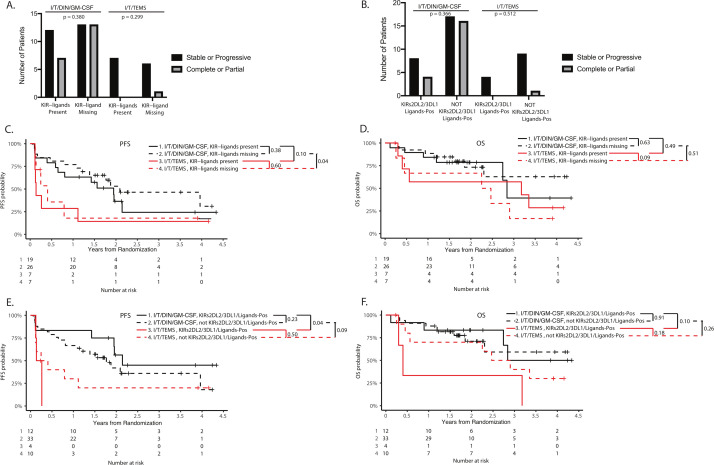Figure 2.
KIR ligand status (missing vs present) and outcome. Neither KIR ligand missing versus nor KIRs2DL2/3DL1/ligands-present genotype is associated with clinical outcome among patients receiving chemoimmunotherapy, nor are these genotypes associated with improved outcome when comparing I/T/DIN/GM-CSF versus I/T/TEMS. A, C, D) There were no differences in response rate (A) or OS (D) for these genotype groupings based on treatment type, nor were there differences in clinical outcome when comparing KIR-ligand missing genotypes versus KIR-ligand present genotypes based on treatment type. Patients with the KIR-ligand missing genotype and patients with the KIR-ligands present genotype, have improved EFS (C) when treated with I/T/DIN/GM-CSF compared with I/T/TEMS (red lines vs black lines; KIR-ligands present: p=0.10, KIR-ligand missing: p=0.04). B, E, F) No differences in response rate were observed based on KIRs2DL2/3DL1/Ligands status (B). However, patients with the KIRs2DL2/3DL1/Ligands-Pos show significantly improved EFS (E) and a trend for improved OS (F) when treated with chemoimmunotherapy as compared with I/T/TEMS (black solid line vs red solid line; EFS: p=0.04, OS: p=0.10). There was a trend toward improved EFS (E) for patients without the KIRs2DL2/3DL1/ligands-Pos genotype), but there was no difference in OS (F) for those not KIRs2DL2/3DL1/Ligands-Pos (black dashed line vs red dashed line; EFS: p=0.09, OS: p=0.26). However, there were no differences observed in EFS or OS when comparing KIRs2DL2/3DL1/ligands-Pos vs not KIRs2DL2/3DL1/ligands-Pos genotypes based on treatment type. DIN, dinutuximab; EFS, event-free survival; GM-CSF, granulocyte macrophage colony-stimulating factory; I/T, irinotecan and temozolomide; KIRs, killer immunoglobulin-like receptor; OS, overall survival; PFS, progression-free survival; TEMS, temsirolimus.

